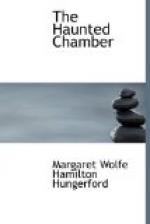In the servants’ corridor a strange dull light is being flung upon the polished boards by a hanging-lamp that is burning dimly, as though oppressed by the dire evil that has fallen upon the old castle. No sound is to be heard here in this spot, remote from the rest of the house, where the servants seldom come except to go to bed, and never indeed without an inward shudder as they pass the door that leads to the haunted chamber.
Just now, being at their supper, there is no fear that any of them will be about, and so the dimly lighted corridor is wrapped in an unbroken silence. Not quite unbroken, however. What is this that strikes upon the ear? What sound comes to break the unearthly stillness? A creeping footstep, a cautious tread, a slinking, halting, uncertain motion, belonging surely to some one who sees an enemy, a spy in every flitting shadow. Nearer and nearer it comes now into the fuller glare of the lamp-light, and stops short at the door so dreaded by the castle servants.
Looking uneasily around him, Arthur Dynecourt—for it is he—unfastens this door, and, entering hastily, closes it firmly behind him, and ascends the staircase within. There is no halting in his footsteps now, no uncertainty, no caution, only a haste that betokens a desire to get his errand over as quickly as possible.
Having gained the first landing, he walks slowly and on tiptoe again, and, creeping up the stone stairs, crouches down so as to bring his ear on a level with the lower chink of the door.
Alas, all is still; no faintest groan can be heard! The silence of Death is on all around. In spite of his hardihood, the cold sweat of fear breaks out upon Dynecourt’s brow; and yet he tells himself that now he is satisfied, all is well, his victim is secure, is beyond the power of words or kindly search to recall him to life. He may be discovered now as soon as they like. Who can fix the fact of his death upon him? There is no blow, no mark of violence to criminate any one. He is safe, and all the wealth he had so coveted is at last his own!
There is something fiendish in the look of exultation that lights Arthur Dynecourt’s face. He has a small dull lantern with him, and now it reveals the vile glance of triumph that fires his eyes. He would fain have entered to gaze upon his victim, to assure himself of his victory, but he refrains. A deadly fear that he may not yet be quite dead keeps him back, and, with a frown, he prepares to descend once more.
Again he listens, but the sullen roar of the rising night wind is all that can be heard. His hand shakes, his face assumes a livid hue, yet he tells himself that surely this deadly silence is better than what he listened to last night. Then a ghostly moaning, almost incessant and unearthly in its sound, had pierced his brain. It was more like the cry of a dying brute than that of a man. Sir Adrian slowly starved to death! In his own mind Arthur can see him now, worn, emaciated, lost to all likeness of anything fair or comely. Have the rats attacked him yet? As this grewsome thought presents itself, Dynecourt rises quickly from his crouching position, and, flying down the steps, does not stop running until he arrives in the corridor below again.




